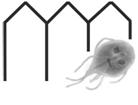

|
Investigating giardiasis and long term complications |
|
Bergen Giardia Research Group |
|
Home |
|
Background |
|
Research projects |
|
Involved researchers |
|
BGRG & publications |
|
News & Links |
|
Home | Background | Research projects | Involved researchers | BGRG & Publications | News & Links |

|
News & Links |
|
May 2022: Gunnhild Sellevoll Hunskår defended her PhD-thesis named "Extra-intestinal complications following acute giardiasis". Press release (Norwegian) Dissertation October 2020: Vernesa Dizdar defended her PhD-thesis on “ Functional Gastrointestinal Disorders following Giardia infection“. Press release (Norwegian) Dissertation August 2019: Sverre Litleskare defends his PhD-thesis on long term complications flowing an outbreak of giardiasis. Press release (Norwegian). Dissertation June 2017: Bergen Giardia Research Group was awarded the Research and innovation prize for 2017 by the Bergen municipality. March 2017: Research collaboration started with the Bellygenes project analyzing DNA from subjects who had Giardia infection in 2004 and developed sequels with irritable bowel syndrome or not. The samples are to be examined together with samples from thousands of other patients with irritable bowel syndrome. The goal is to explore genetic risk factors for irritable bowel syndrome. This may be very informative regarding the underlying mechanisms behind the development of these symptoms. January 2015: 10 years after the outbreak. Follow up postal questionnaires and saliva sampling devices, are sent to the 1252 individuals who had laboratory confirmed Giardia infection during autumn 2004 and spring 2005. A control group received the same questionnaire. December 2012 : Two days work seminar at Voss, focusing on discussions and planning of further research within Bergen Giardia Research Group. January 2012: Kurt Hanevik defends his PhD-thesis the 20th of January on duodenal inflammation, symptoms and immune responses in patients with long term functional gastrointestinal disorders and chronic fatigue syndrome after Giardia infection. November 2011: Knut-Arne Wensaas defends his PhD-thesis on long term post-giardiasis irritable bowel syndrome and chronic fatigue. September 2010: Follow up postal questionnaires, 6 years after the outbreak, are sent to the 1252 individuals who had laboratory confirmed Giardia infection during autumn 2004 and spring 2005. A control group received the same questionnaire. May 2010: Kristine Mørch defended her PhD-thesis on treatment of chronic giardiasis and long term post-giardiasis abdominal symptoms and fatigue. March 2010: Participation in outbreak investigation in a day care center in Bergen March 2009: Starting up a new study with a thorough clinical evaluation and characterization of patients with fatigue following Giardia infection. Persons with persisting fatigue will be offered to enter a psycoeducational vs behavioural cognitive therapy treatment trial. January 2009: Research seminar at Solstrand hotel with presentations and discussions of the research and ongoing projects related to the observed sequelae of the Giardia epidemic. April 2008: An article summarizing treatment efforts is published in Journal of Infection. It analyses the treatment of 40 patients with metronidazole-refractory chronic Giardia infection who were referred to Haukeland University Hospital in the period January 2005 until March 2006. October 2007: Postal questionnaires, 3 years after the outbreak, are sent to the approximately 1300 individuals who had laboratory confirmed Giardia infection during autumn 2004 and spring 2005. A control group receives the same questionnaire. The study aims to map the extent of long term symptoms like fatigue and abdominal symptoms three years after Giardia infection.
Bergen Giardia Research Group in the media (mostly in Norwegian)
Links to related information
Information on Giardia infection from Up to Date
Giardia-utbruddet i Bergen høsten 2004 - Report from the external investigation - PDF-file
GENIEUR - pan-European interdisciplinary network to identify genetic factors (human genetics, epigenetics, metagenomics) contributing to etiopathogenesis of irritable bowel syndrome
|
